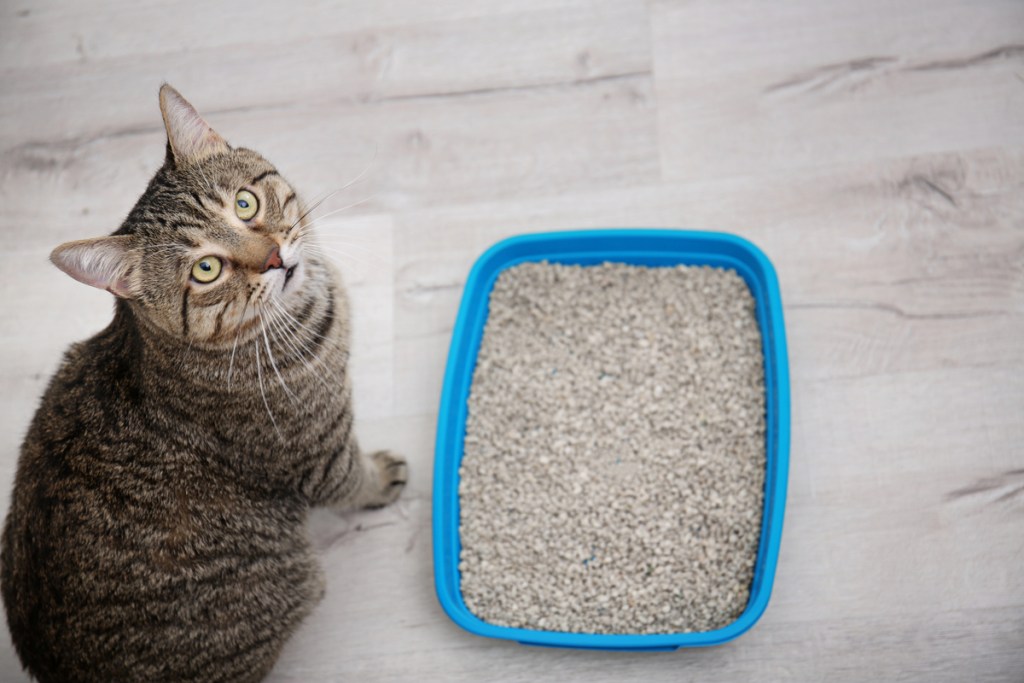Cleaning your cat’s litter box is an important part of keeping your cat happy and healthy. Stinky litter boxes are also full of germs, and your cat may decide just not to use a litter box that he feels is too smelly. Regular cleaning can help prevent this.
But cleaning is effective only if you do it right. With the right tools and the right process, you can help keep your cat’s litter box inviting and more pleasant for him to use — and for you to be around. From the right amount of cat litter to how to make cleaning safer for you, here are some important things to know about cleaning a litter box the right way.

Start with the right tools
Having the right tools will help you clean your cat’s litter box better and more effectively. You’ll need the following:
- Plastic bag or trash bag to hold the cat litter
- Scrub brush
- Water
- Soap
- Paper towels
- Cat litter
- Litter box liner (optional)
It’s also a good idea to wear rubber gloves while cleaning a litter box. This can help reduce your exposure to T. gondii, a parasite that can inhabit cat feces and could give you toxoplasmosis. Regardless of whether you choose to wear gloves, be sure to wash your hands thoroughly after cleaning your cat’s litter box.
Deep clean the box
You should give your cat’s litter box a deep cleaning every week. During this cleaning, you’ll not only be changing cat litter but will also be thoroughly cleaning the box itself.
To start, empty out all the litter into a plastic bag or trash bag. Scrape the bottom of the box with the litter scoop to remove any stuck litter.
Next, scrub out the litter box with soap and warm water. Avoid using bleach, ammonia, or strong cleaning chemicals, since these can irritate your cat’s respiratory system and make him avoid using the box. Instead, use a mild household soap.
As you clean, get down into the corners with a scrub brush. Finish up by thoroughly rinsing the box and drying it with a paper towel.
Use your cat’s preferred litter
Abruptly changing up your cat’s litter can leave him upset and confused, and it might even cause him not to use his box. Once you’ve found a cat litter that your cat likes, try to stick with it.
When you add new litter to the box, it’s important to pour in just the right amount. Generally, 2 to 4 inches of litter works well, but you may find your cat has different preferences. If you notice that your cat is going only partially in the box, is digging around a lot before doing his business, or won’t use the box at all, the box may have too much litter.
You can also use a litter box liner to help ease the task of cleaning your cat’s litter box. A liner sits inside the bottom of the box and extends up over its edges, and then you put the litter down into the liner. When it comes to cleaning the box, you can simply lift up the liner, neatly bagging the litter inside it. If you decide to use a liner, be sure to choose one that fits the dimensions of your litter box for the best results.

Get on a schedule
You’ll need to do a deep cleaning of your cat’s litter box at least once a week. How often to change Kitty’s litter also depends on your pets. If you have a multi-cat home or a cat who has a health issue, like kidney failure, that causes him to urinate more often, you may need to do this deep cleaning more frequently. A deep cleaning can help minimize litter box odors, keeping the box cleaner and more appealing so that your cat continues to use it.
In between these deep cleanings, do quick daily litter box cleanings to keep the box neat. Scoop out the box and put poops into a plastic bag. Never flush the cat litter, since this can clog up plumbing and harm your septic system.
Make these cleanings a part of your routine so you don’t forget them.
Cleaning the litter box is an important element of keeping your cat both happy and healthy. A clean litter box is more appealing to cats, and it can help address some litter box issues that your cat might be having. A less stinky box will be more enjoyable for your cat, and it can help your home smell better, too. Plus, cleaning a litter box regularly keeps the job manageable and easier. When you combine once-a-week thorough cleanings with daily quick cleanings, you’ll be supporting your cat’s health and contributing to his happiness.


